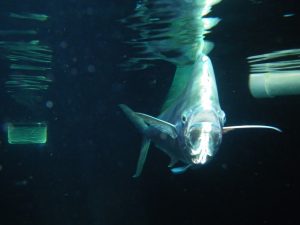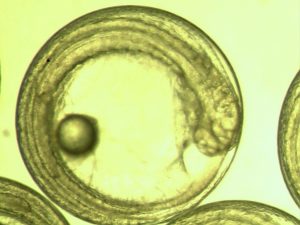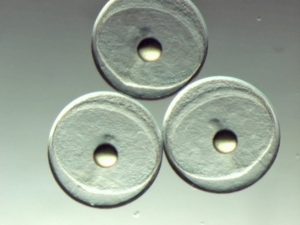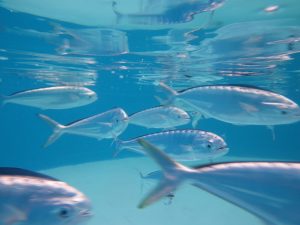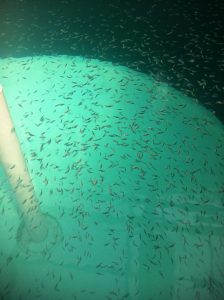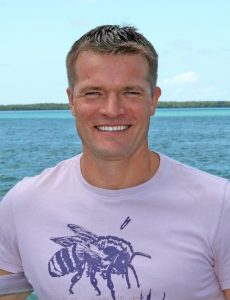Getting to the Heart of Oil Spill Impacts on Gulf Fish
– January 27, 2015
RECOVER consortium studies cardiac outcomes in oil-exposed fish
Do fish recover from oil exposure? The Gulf of Mexico Research Initiative recently awarded the RECOVER consortium a grant to study coastal redfish and offshore mahi-mahi, two commercially and recreationally important Gulf fish, to answer that and related questions. This is the first known study that will directly measure cardiac output of oil-exposed fish.
RECOVER Director Dr. Martin Grosell with the University of Miami Rosenstiel School of Marine and Atmospheric Science shared some thoughts about their team’s project.
“We will test for delayed and sublethal oil impacts in individual fish and attempt to assess impacts on populations that potentially affect recovery.”
RECOVER stands for Relationship of Effects of Cardiac Outcomes in fish for Validation of Ecological Risk. This consortium will combine sophisticated molecular approaches with state-of-the-art organ level and whole animal physiology, improving understanding of oil-induced toxicity in fish. Better knowledge of toxic mechanisms will provide a crucial foundation for predicting effects on other species and best practices for managing future spills. Their studies of potential reversal and recovery from induced effects seek to inform population ecologists and assist ecosystem effect predictions.
“We are increasing the level of complexity by looking at intact animals, interactions among animals, and gene expressions to identify molecular or biochemical pathways for exposure. We are taking what we’ve learned so far at the individual effect level and then pursuing higher and lower levels of biological organization to explain why we are seeing these effects and to gain understanding of what it really means in the bigger picture.”
This project considers the heart as one possible site of impact where even slight impairments can have far-reaching and potentially fatal effects.
“Considering impacts on the heart, heart rate is only half the equation. What matters to fish performance is cardiac output, the heart rate combined with the amount of blood that is pumped by the heart at each contraction. To determine heart function in fish, we will subject them to swim performance tests.”
Swimming capacity is critical for vital functions like prey capture, predator avoidance, migrations, and spawning. The RECOVER team is building on their past research, which focused on short-term effects.
“We’ve observed that fish do not swim well after oil exposure, and we want to understand why. One hypothesis is that these observations are explained by impaired heart function but alternative hypotheses are also being considered.”
Cardiac function in fish embryos, which are transparent, will be analyzed using high-speed video imaging that captures the heart contracting and expanding as it beats. For adult fish, surgically implanted probes in atrial vessels will collect real-time measurements of blood flow from the heart to the gills as the fish swim at increasing velocities.
RECOVER’s preliminary work suggests that swimming efficiency may be affected in oil-exposed fish, so the team will observe swimming kinematics. The RECOVER investigators will tag fish tails with florescent markers and use high-speed video cameras to capture and digitize tail movement. Digitizing fish movement makes observations quantitative and thereby improves statistical analyses.
“There may not be a single answer to a question – there may be several. We are pursuing at least four different avenues to explain the reduced swimming performance in oil exposed fish.”
Fish may be able to recover from short-term oil exposure through repair mechanisms or other compensatory mechanisms. The RECOVER team will address questions about rate and extent if their research shows that recovery occurs.
To communicate their science, the team plans to make the most of the video imaging collected in their research and encourage deeper learning.
“Combining video imaging with big, charismatic fish will help us get people’s attention with a “wow” experience. That’s when you can add more information. Adding some excitement is going to facilitate the communication of our scientific findings.”
The team, as Grosell describes, includes a healthy mix of senior scientists spanning 30 years’ experience and young, enthusiastic assistant professors, post-docs, and graduate students. The team understands the need to develop highly-skilled scientists who can continue addressing ocean environmental problems for decades to come.
“It is important to have scientific impact by producing data and knowledge, but it is no less important to leave a legacy of training with respect to approaches and future research.”
The RECOVER consortium includes the University of Miami, the University of Texas at Austin, the University of California Riverside, and the University of North Texas. For more RECOVER program and people information, click here.
************
The Gulf of Mexico Research Initiative (GoMRI) is a 10-year independent research program established to study the effect, and the potential associated impact, of hydrocarbon releases on the environment and public health, as well as to develop improved spill mitigation, oil detection, characterization and remediation technologies. An independent and academic 20-member Research Board makes the funding and research direction decisions to ensure the intellectual quality, effectiveness and academic independence of the GoMRI research. All research data, findings and publications will be made publicly available. The program was established through a $500 million financial commitment from BP. For more information, visit https://gulfresearchinitiative.org/.
© Copyright 2010- 2017 Gulf of Mexico Research Initiative (GoMRI) – All Rights Reserved. Redistribution is encouraged with acknowledgement to the Gulf of Mexico Research Initiative (GoMRI). Please credit images and/or videos as done in each article. Questions? Contact web-content editor Nilde “Maggie” Dannreuther, Northern Gulf Institute, Mississippi State University (maggied@ngi.msstate.edu).

